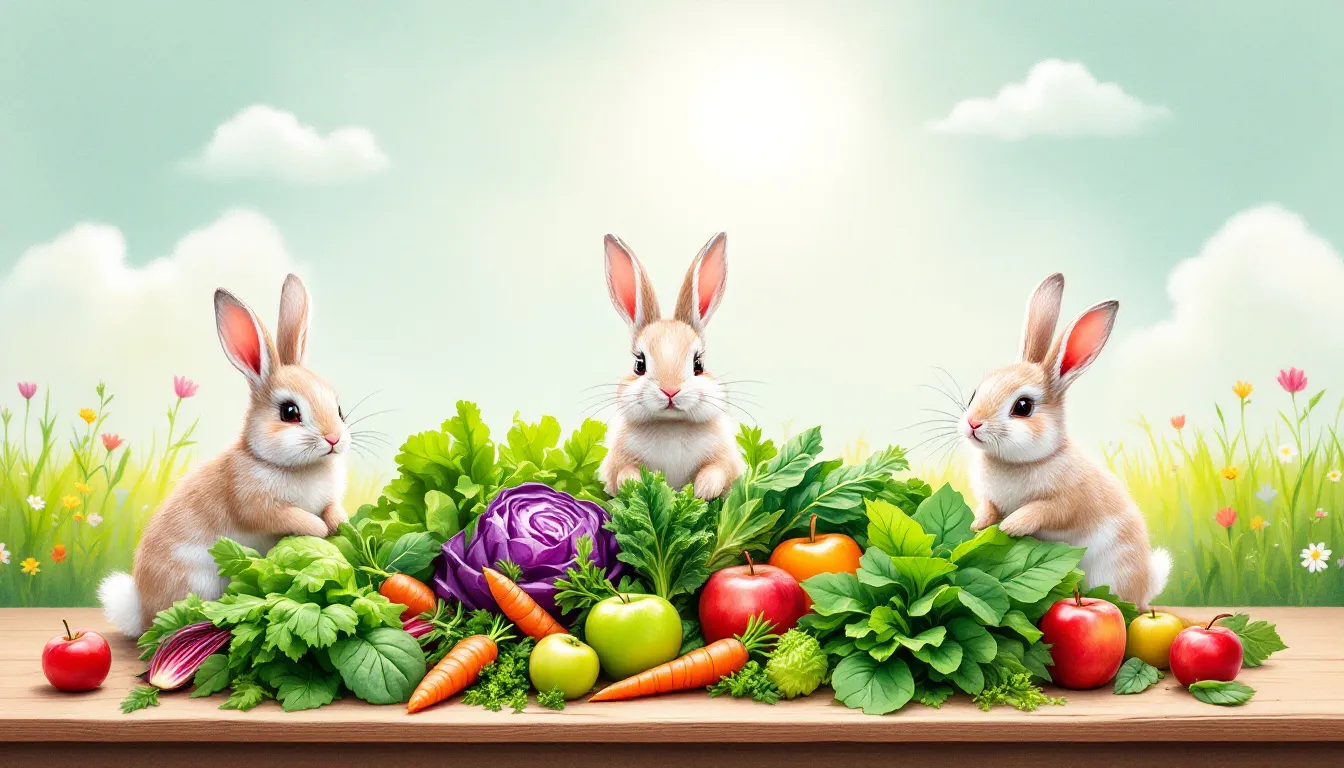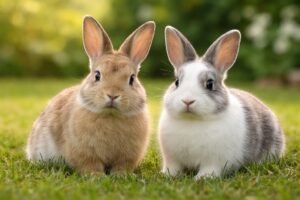For a healthy Holland Lop diet, provide unlimited hay, fresh vegetables, limited pellets, and occasional treats. This guide will break down each component to keep your bunny in optimal health.
Key Takeaways
-
Hay should make up 85% of a Holland Lop’s diet to ensure digestive health and prevent issues like GI stasis.
-
Fresh vegetables are vital for providing additional nutrients; introduce them gradually to avoid digestive problems.
-
Pellets should comprise only 10% of the diet, and treats like fruits should be given sparingly to maintain overall health.
The Importance of Hay in a Holland Lop’s Diet

Hay is the cornerstone of a Holland Lop’s diet, providing essential roughage to prevent digestive blockages common in rabbits due to their unique digestive systems. The high fiber content in grass hay and rabbit hay is essential to maintain digestive health and prevent gastrointestinal stasis (GI stasis), a potentially life-threatening condition where the digestive system slows down or stops.
Holland Lop rabbits should have unlimited hay daily to reduce the risk of hairballs and prevent tooth overgrowth. Hay helps manage their continuously growing teeth, preventing dental problems. Introducing hay to baby bunnies early fosters healthy eating habits.
Different types of hay serve various purposes. Timothy hay is ideal for adult rabbits due to its balanced nutritional profile. Alfalfa hay, rich in calcium and protein, suits young bunnies but should be limited for adults to prevent obesity and urinary issues. Other grass hays, like orchard grass and oat hay, add variety to your bunny’s diet. However, Timothy hay remains the preferred type of hay for feeding Holland Lops.
Hay should constitute about 85% of an adult rabbit’s diet, ensuring they receive the necessary nutrients and fiber, as recommended by the House Rabbit Society. Unlimited amounts of hay should make up 80-85% of a Holland Lop’s diet to support their overall health.
Fresh Vegetables for Nutrient Variety

While hay forms the bulk of a Holland Lop’s diet, fresh vegetables are crucial for providing nutrients that hay alone cannot offer. Leafy greens like romaine lettuce, bok choy, collard greens, and leaf lettuce are rich in vitamins and minerals, supporting a healthy immune system and proper organ function. Fresh greens should make up about 10% of a Holland Lop’s diet after they are 6 months old.
Gradually introduce a variety of leafy greens to avoid digestive issues. Start with one type and monitor your bunny’s reaction. If tolerated well, slowly increase the variety. Limit high-oxalate greens like spinach and kale to avoid potential health risks. Introduce greens gradually to avoid digestive upset in rabbits.
Feed 1-2 cups of fresh vegetables for every 4 lbs of body weight to support healthy digestion and ensure a balanced diet. Aim to provide at least one packed cup of leafy greens daily for every 2 lbs of body weight for optimal health.
A variety of fresh greens and fresh vegetables will keep your bunny healthy and make mealtime more enjoyable.
Limited Use of Pellets
Pellets should comprise no more than 10% of a Holland Lop bunny’s daily diet to prevent digestive issues and obesity. A modest portion of high-quality, timothy-based pellets is recommended for adult bunnies, with a minimum fiber content of 18% and free of grains and added sugars. Pellets should not contain grains, nuts, or colorful bits to ensure they are healthy. Lop bunnies should be monitored closely to ensure they maintain a healthy weight.
For adult Holland Lops, provide no more than 1/4 cup of pellets per five pounds of body weight. This ensures they get the necessary nutrients without excess calories. Adults should receive a small amount of high-quality pellets, typically 1/4 cup per 5 pounds of body weight. Overfeeding pellets can lead to selective feeding, causing an imbalanced diet and health problems.
Offer unlimited fresh hay daily, constituting about 85% of an adult rabbit’s diet. Pellets can supplement but should never replace hay and fresh vegetables. Carefully measuring and limiting pellet intake helps maintain your Holland Lop’s health and prevent overfeeding.
Treats and Fruits: A Special Occasion
Treats and fruits can be a delightful addition to your Holland Lop’s diet, but should be given in moderation. Fruits like strawberries and blueberries are tasty and packed with beneficial antioxidants. However, their high sugar content can lead to overweight rabbits and related health issues. Fruits should only be given in moderation due to their high sugar content.
Offer fruits only once or twice per week as an occasional reward. Overfeeding fruit can disrupt digestive health, leading to gastrointestinal issues. Use fruits like bananas and grapes sparingly due to their high sugar content. If you want to maintain a balanced diet, consider when to stop eating certain foods.
Treat fruits as special sweet treats rather than regular diet components to keep your Holland Lop healthy and happy.
Safe and Unsafe Foods for Holland Lops

Knowing which foods are safe and which are not is crucial for maintaining a healthy diet for your Holland Lop. Fresh vegetables and certain herbs provide essential nutrients without posing health risks. However, some seemingly harmless foods can be dangerous or even fatal to rabbits.
Prepare fruits without seeds, as some seeds, like those in apples, are harmful to rabbits. Root vegetables like carrots are not recommended for Holland Lops due to their high sugar content. Carrots should be avoided as they are not part of a rabbit’s natural diet and can lead to health issues. Avoid feeding rabbits human foods such as chocolate and bread, as these can disrupt their delicate digestive systems and cause severe health issues.
Processed human foods can also disrupt the delicate digestive balance of Holland Lops. Avoid root vegetables and stick to a diet rich in fresh vegetables, certain fruits, and high-quality hay. Understanding what a Holland Lop rabbit can and cannot eat helps keep your rabbit happy and healthy. Holland Lops should not eat processed human foods due to their delicate digestive systems.
Special Dietary Needs

Holland Lop rabbits have different dietary needs at various life stages. Young rabbits under seven months old should not be given any fruit due to their developing digestive systems. They require a different nutritional balance compared to older rabbits.
Nursing or underweight rabbits may need larger quantities of pellets to gain weight and meet nutritional needs. Consult a rabbit-savvy vet for any diet adjustments to ensure your bunny receives a proper diet tailored to their needs.
Understanding and catering to these special dietary needs is crucial for maintaining your Holland Lop’s health and well-being.
Hydration Essentials
Hydration is vital for a Holland Lop’s diet. Rabbits need consistent access to fresh water to stay healthy and hydrated. Provide water in both a bowl and a bottle, as each method has its benefits and mimics their natural drinking behavior. Regularly clean and change the water to prevent contamination and ensure your bunny always has access to fresh water.
Adequate water intake flushes out excess calcium and prevents GI stasis. Adding a small amount of apple cider vinegar to your bunny’s water can help maintain a healthy gut and immune system. Keeping your Holland Lop hydrated is crucial for its overall health and well-being, as it can help prevent GI stasis.
Monitoring Digestive Health
Monitoring your rabbit’s digestive health prevents serious health issues. Healthy rabbit stool should be large, round, and golden-brown. Regularly observing your bunny’s stool helps detect early signs of digestive distress and address potential issues promptly.
Changes in appetite or stool production can indicate digestive health problems. Wet and runny stool may suggest your rabbit is consuming too many watery vegetables, leading to digestive disturbances. Strands of fur in the stool indicate a need for increased fiber and proper grooming to prevent hairballs.
Dark-colored or abnormally shaped stool can signify dehydration, impacting digestion. Hydration maintains a healthy digestive system, helping food move smoothly through the gut. Regular veterinary check-ups identify underlying health issues that may affect your rabbit’s digestion.
Closely monitoring your rabbit’s digestive health ensures they remain happy and healthy.
Summary
In conclusion, providing a balanced diet for your Holland Lop is essential for their health and happiness. From the foundational importance of unlimited hay to the variety of fresh vegetables and the limited use of pellets, each component plays a crucial role in maintaining your bunny’s wellbeing. Treats and fruits should be given sparingly, and it’s vital to be aware of safe and unsafe foods to avoid potential health risks.
Hydration and monitoring digestive health are equally important in ensuring your Holland Lop stays healthy. By following these guidelines and consulting with a rabbit-savvy vet for any dietary adjustments, you can provide the best care for your beloved bunny. Ensuring a proper diet is not just about feeding your rabbit but about nurturing a healthy, happy life for them.
Frequently Asked Questions
How much hay should I provide my Holland Lop daily?
Holland Lops should have unlimited access to hay daily to promote digestive health and prevent dental problems. Providing a constant supply will keep your rabbit healthy and happy.
Can I feed my Holland Lop any type of vegetable?
You can feed your Holland Lop various leafy greens, but be cautious with high-oxalate greens and root vegetables, which should be limited or avoided. Always introduce new vegetables gradually to ensure their safety.
How often can I give my Holland Lop fruit?
You can give your Holland Lop fruit once or twice a week as an occasional treat due to its high sugar content. Moderation is key to maintaining their health.
What are some common signs of digestive issues in Holland Lops?
Common signs of digestive issues in Holland Lops include changes in appetite, abnormal stool consistency, such as wet, runny, or dark-colored stool, and decreased stool production. It’s crucial to monitor these symptoms and consult a veterinarian when they occur.
Should I provide water in a bowl or a bottle for my Holland Lop?
Providing both a bowl and a bottle for your Holland Lop is the best approach, as it allows for consistent access to fresh water and caters to their drinking preferences. This ensures they stay well-hydrated and healthy. Hydration for Holland Lops is best provided with fresh water in a bowl.



